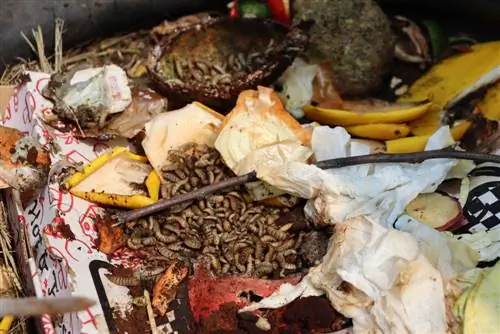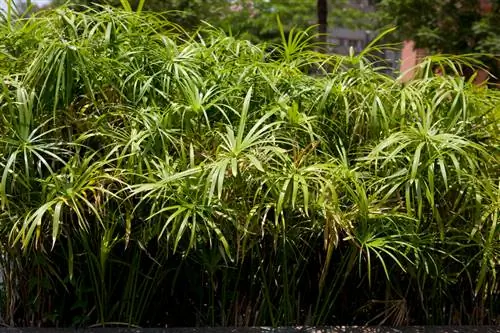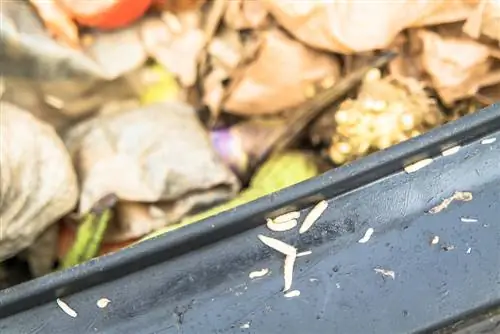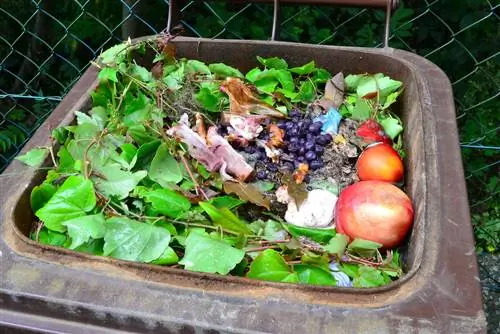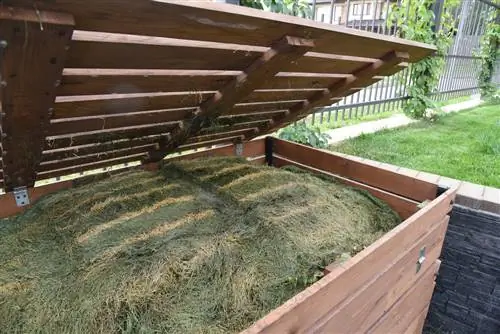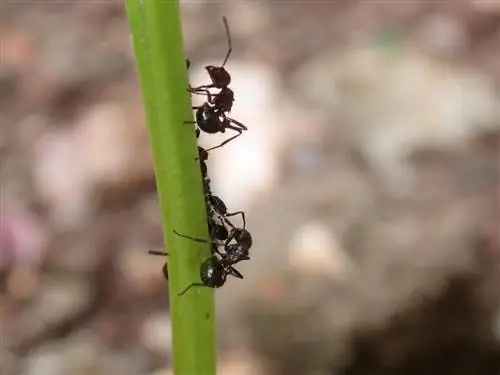- Author admin [email protected].
- Public 2023-12-16 16:46.
- Last modified 2025-06-01 06:02.
Maggots in the organic waste bin push even die-hard nature lovers to their limits. Read this guide on how to combat an acute maggot infestation with effective means. You can find out how nasty pinworms develop here. Useful tips explain how you can successfully avoid nasty maggots in organic waste.
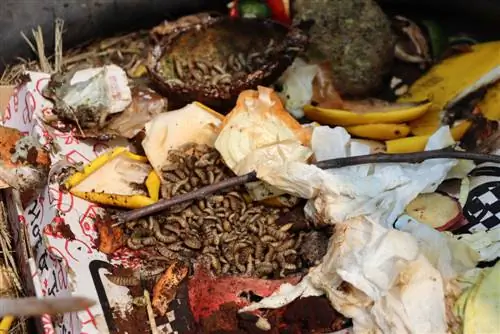
Which measures help against maggots in the organic waste bin?
To effectively combat maggots in the organic waste bin, home remedies such as table s alt, vinegar water, bleach or pepper water can be used. Cleaning the bin regularly, using an airtight lid and packing leftover meat and fish in compostable bags will help prevent maggot infestation.
- Effective remedies against maggots in the organic waste bin are table s alt, vinegar water, organic waste bin powder and slaked lime.
- Maggots in organic waste bins arise from the eggs of blowflies, houseflies and fruit flies.
- Pinworms can be avoided if the organic waste bin is placed with an airtight lid in a shady, cool location and if organic waste is collected in a dry, well-packed and airy place.
What helps against maggots in the organic waste bin?
Maggots in the organic waste bin pose no immediate danger to adults, children and pets. However, upon direct contact, pinworms can transmit diseases such as tuberculosis, typhus, wound infections and anthrax. Furthermore, the feelings of disgust associated with maggots should not be underestimated, as they can cause severe nausea and vomiting in sensitive sufferers. This makes the urgent desire to destroy the larvae immediately all the more understandable. The following table summarizes what effectively helps against pinworms in the organic waste bin:
| Home remedies | poison-free products | manual methods |
|---|---|---|
| common s alt | Organic bin powder | 3-step immediate action |
| Vinegar water | Rock flour | hairdryer |
| bleach | Lime (deleted) | |
| Pepperwater | Diatomite |
Has one or other effective means aroused your interest in killing maggots quickly and without using poison? Then read on, because the individual procedures are explained in more detail below:
Use home remedies correctly - This is how it works
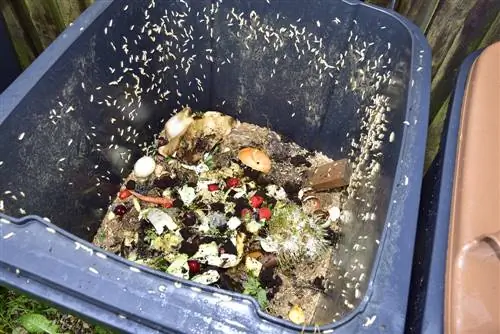
Maggots can be successfully combated with simple home remedies
If the right home remedies are used, the days of nasty maggots in the organic waste bin are numbered. The table above names the four best remedies that can be used to successfully combat worms. The correct application summarizes the following overview:
- Saline: sprinkle immediately on the maggots
- Vinegar water: add 4-5 tablespoons of vinegar essence to 1 liter of water, pour into a spray bottle and spray on maggots
- Bleach: stir 2-3 tablespoons of bleach into 1 l of hot water and spray sparingly onto the worms using a hand sprayer
- Pepper water: Bring 1 liter of water to the boil, stir in 3-4 tablespoons of pepper powder and use as a spray
Please note that bleach is environmentally friendly oxygen bleach. In contrast to toxic bleaches containing chlorine, such as the well-known disinfectant Danklorix, the use of oxygen bleach is significantly safer and is just as effective against maggots.
Non-toxic products - tips for use
If you don't want to plunder your supply of s alt, pepper, vinegar and bleach, use non-toxic products from the shops. One of the top 4 most effective products against maggots is organic bin powder. The product does not contain any insecticides, but destroys the worms based on natural components. Organic bin powder (€23.00 on Amazon) is available in pharmacies, drugstores, hardware stores and numerous online shops. The non-toxic powder destroys maggots, prevents rot and reduces bad smell.
Hobby gardeners always have rock dust on hand to prevent the development of odors when making nettle manure or in the compost heap. Rock dust is less well known as an effective remedy against maggots in organic waste. A thin layer of powder over each new filling is enough to put an end to malicious maggots.
If you struggle with maggots in the organic waste bin, please note slaked lime on your shopping list for the hardware store. Slaked lime dries out the beasts and kills them in no time. Diatomaceous earth is just as effective in its role as a non-toxic maggot repellent. Sprinkled directly on the wriggling larvae, diatomaceous earth removes all moisture from their bodies. Diatomaceous earth is also known as diatomaceous earth and has earned a good reputation in the fight against flour moth maggots.
Manual Methods - Quick Guides
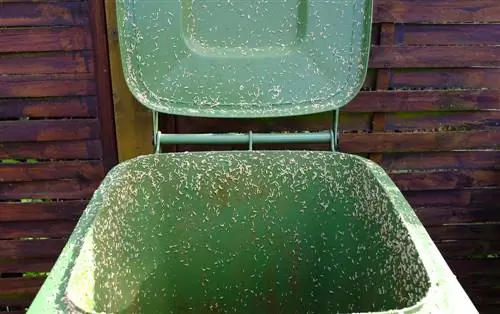
If maggots remain on the empty organic waste bin, it should be rinsed out with hot water
In most cases, home remedies and non-toxic products against maggots have to be brought in first. Instead, you can roll up your sleeves and immediately destroy nasty pinworms using manual methods. The 3-step immediate measure requires a courageous approach and in return gets rid of the problem immediately. The following quick guide explains what you need and how to proceed step by step:
- Best time: shortly before the next garbage collection
- Material: Gloves, apron or disposable overalls, rubber boots, express kettle or pot of boiling hot water, rake, pressure washer, vinegar water, sponge
- Preparation: Put on gloves, rubber boots and water-repellent clothing
- Step 1: Tip over the maggot-infested organic waste bin and pull out the contents with the rake
- Step 2: Pour boiling hot water over organic waste until all maggots are destroyed, cover with foil and let dry
- Step 3: Clean the organic waste bin, fill it with dried, maggot-free garbage and place it on the street for disposal
Alternatively, expose the organic waste bin and its contents to strong heat from a hairdryer. Since maggots consist mainly of water, the monsters have no resistance to the hot air flow and starve. At least you can fight the maggots in and on the upper layers of garbage this way.
Excursus
Cleverly upcycle raw meat and fish leftovers - 2 ideas
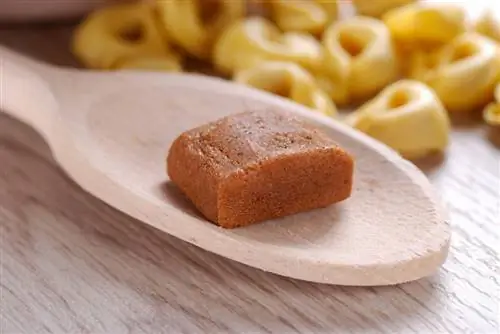
You can make delicious stock cubes from leftover meat
Leftovers of raw meat and fish are great food for maggots in the organic waste bin. Instead of serving the worms in the organic waste a sumptuous fresh meat buffet, resourceful gardeners have developed two ideas for upcycling. Cook leftover raw meat or fish in water with a spicy bouillon cube to make a delicious stock. The boiled remains have no significant attraction to pinworms in the organic waste bin. Meat, fish and other kitchen waste go into a bokashi bucket for complete recycling. With the exclusion of oxygen and the addition of Bokashi ferment, garbage is transformed into rich liquid fertilizer for your houseplants.
How do maggots form in the organic waste bin?
Getting rid of maggots goes unnoticed by very few people affected. Nobody is interested in another confrontation with the disgusting crowd in the organic waste bin. So the question arises: How do maggots actually arise in the organic waste bin? Read the answer here:
Maggots in the organic waste bin are the larvae of blowflies, houseflies or fruit flies. When looking for a warm, moist place to lay their eggs with plenty of food for their offspring, the females find ideal conditions in the organic bin. Fertilizer gases and the smell of organic waste show the way for egg-laden flies. When leftover meat and other animal foods decompose, the fumes attract hordes of houseflies and blowflies. Fruit flies cannot resist the smell of rotten fruit.
A single blowfly clutch can contain several hundred eggs. Female fruit flies are just as busy and lay up to 400 eggs in organic waste. Within a short time the maggots hatch and within a few days they transform into sexually mature flies and also lay eggs. There is a vicious circle going on in the organic waste bin that needs to be stopped.
Avoid maggots in the organic waste bin - How does it work?
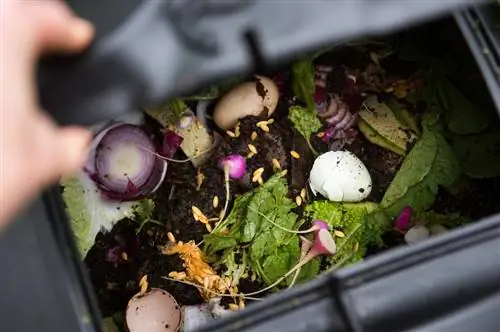
The organic waste bin should always be closed properly
The time window for maggot infestation in the organic waste bin is open from April to October. As long as flies are on the move, please pay attention to the following measures for effective prevention:
| Prevention | done right |
|---|---|
| Close the lid | lockable lid with rubber seal |
| Location | place in the shade and cool |
| packaging | Meat and fish in compostable bags |
| essential oils | Drizzle on garbage, rub lid |
| newspaper | put between the trash |
| Cat litter, hay, straw | spread on organic waste |
| Cleaning | clean with high-pressure cleaner |
| Sink | Sink the organic waste bin into the ground |
Experts agree that there is no complete prevention against pinworms in the organic waste bin. A sensible combination of various preventative measures still promises maximum success.
Airtight lid
When buying an organic waste bin, make sure it has a lid with a rubber seal. Alternatively, simply retrofit the existing barrel lid. The less smell escapes from the organic waste, the less attractive it is to flies and maggots.
Location
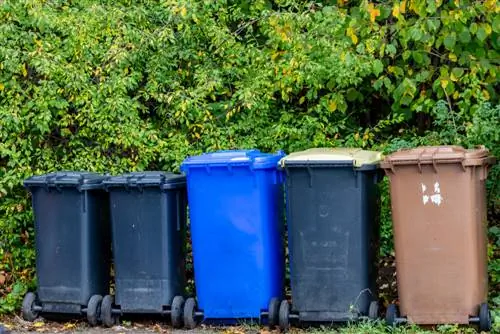
A compost bin should, if possible, not be left in the sun
Bright sun and the associated heat development fuels the development of lousy maggots in the organic waste bin. If you choose a shady, cool location, this will slow down the decomposition process in organic waste. A smart move is a spot on the north side of the house. Surrounded by a shady hedge, the garbage can in the front garden is hidden from the prying eyes of passers-by.
Pack correctly
Wrap organic waste so that no or as little smell as possible escapes. Kitchen roll, uncoated newspaper or paper napkins are well suited. Please note that so-called compostable organic waste plastic bags are not suitable. Only bags made of paper or corn starch can be used as packaging for leftover meat, fish and fruit to avoid odors and prevent maggots.
Essential oils
The intense scent of essential oils has a repellent effect on female flies when they approach. For best results, use citrus oil, tea tree oil and lavender oil. Drizzle a little oil on the organic waste every now and then. Additionally, put a few drops on a cloth and wipe the garbage lid inside and out.
Newspaper, cat litter, hay, straw
Dryness is the key if you want to avoid maggots in the organic waste bin. Don't just wrap suspicious rubbish, but also place newspaper between the rubbish bags. Old newspapers and advertising leaflets (not glossy brochures) absorb excess moisture. Alternatively, use organic cat litter, hay, straw or sawdust as an intermediate layer to create dry conditions in the organic waste bin.
Cleaning
Flies and maggots have an aversion to cleanliness. A sparkling clean organic waste bin is therefore a good prevention because no or only a slight smell of decomposition can form. After each garbage collection, get out the high-pressure cleaner and clean the bin thoroughly inside and out. Wipe with vinegar water. A few drops of essential oil round off the measure.
Sink organic waste bin
The luxury version to prevent maggots keeps the organic waste bin out of the reach of vicious flies. At the push of a button, the electrical system allows the waste container to disappear into the ground under a walk-in cover. The bin is only brought out into the daylight to be filled and for garbage collection. The lift can be continuously controlled, so that even children and wheelchair users can easily fill in the rubbish. Of course, this much comfort comes with a price starting at 3,500 euros.
Tip
Equip your organic waste bin with a special maggot lid. The investment is worth it because the practical utensil puts an end to nasty maggots and bad smells. The organic filter lid is available in different colors and sizes, suitable for every common organic waste bin. The filter integrated in the lid must be replaced every two years.
Frequently asked questions
How long does it take for maggots to appear in the organic waste bin?
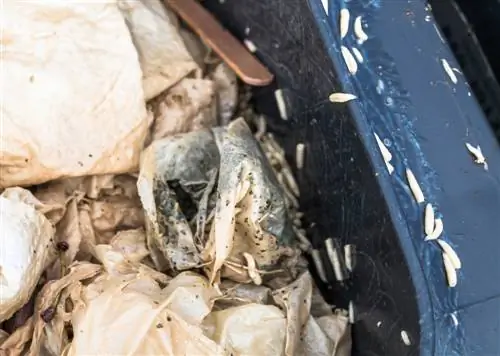
Maggots hatch in less than an hour in good conditions
Under ideal conditions with a humid temperature of around 37° Celsius, it only takes 30 minutes for a fly egg to hatch into a maggot. At temperatures around 25° Celsius, the process takes around 12 hours. Cooler conditions of 18° to 23° Celsius delay the development of pinworms by a further 12 hours. In general, it should be noted that during the warm season between April and October it does not take longer than 24 hours for maggots to appear in an organic waste bin.
Are maggots in the organic waste bin dangerous?
The sight of maggots in the organic waste bin makes most people feel massively disgusted. Apart from that, the whitish larvae pose no danger. In fact, doctors have discovered that the insect larvae can cure stubborn skin inflammation and severe necrosis. Survival experts know that maggots contain plenty of protein and nutrients. Under extreme conditions, consumption can save you from certain death from starvation.
Are there predators that remove maggots from the organic waste bin?
In fact, maggots are at the top of the menu for birds. For this reason, the tip circulating online is to leave the organic waste bin open for a while every day. According to the motto: The maggot enemy is the gardener's friend, birds should take care of the worms in organic waste. However, there are other predators at the inviting buffet, such as rats and mice. Female flies do not miss the opportunity to lay more eggs on the open garbage. Furthermore, it is doubtful that pecking birds can effectively combat an impending maggot invasion.
Can you remove isolated maggots by hand?
Yes, if you can bring yourself to pick up maggots. However, we strongly recommend putting on gloves beforehand. Depending on which species of fly laid the eggs, the larvae that hatch from them can transmit serious diseases. Simple rubber gloves are sufficient to protect against direct skin contact.
Tip
Do not throw away the small, white bags found in shoe boxes and other product packaging. These silica packets are an excellent way to prevent nasty maggots in the organic waste bin. Each bag contains a natural absorbent and ensures dryness in the garbage can, which the larvae don't appreciate at all.

